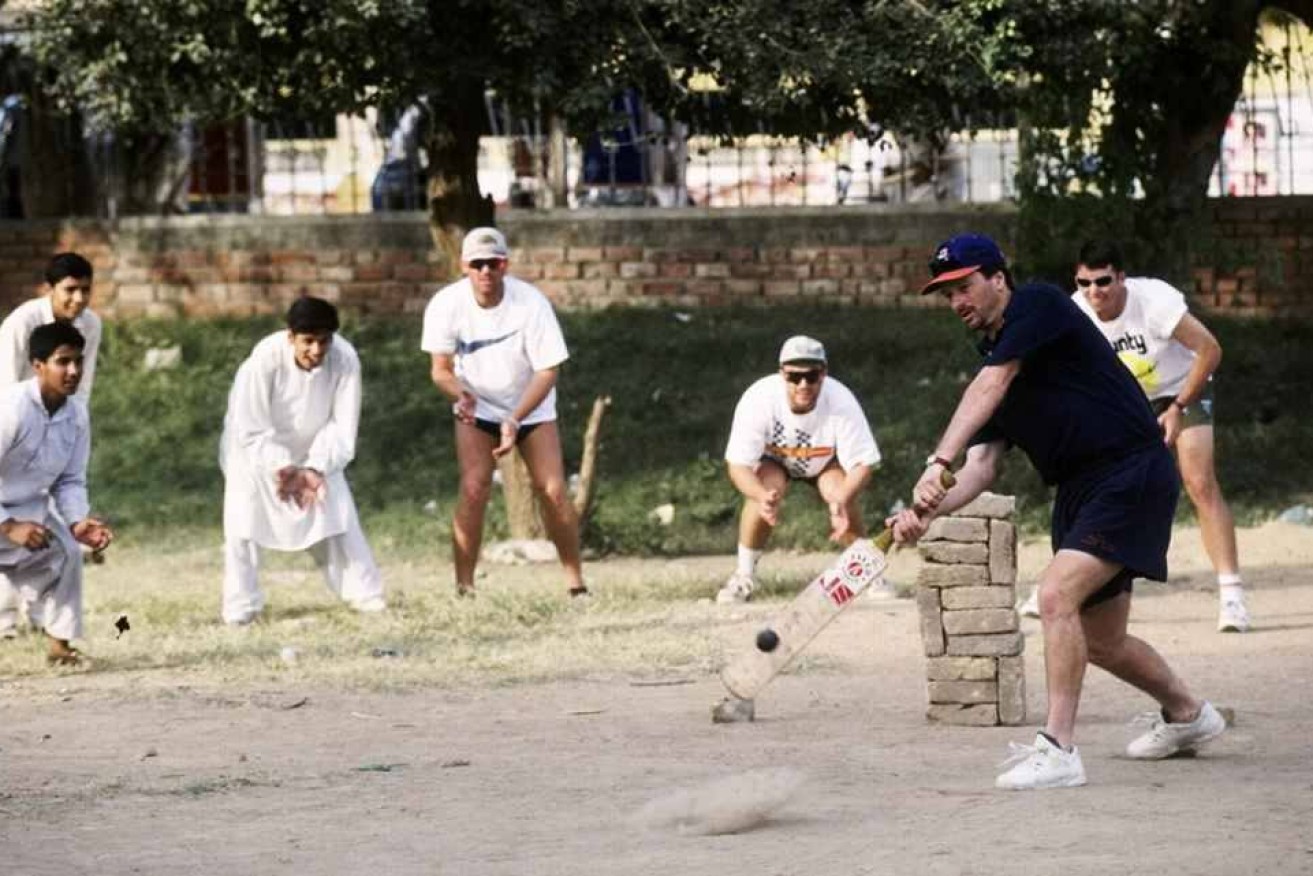All bets are off as Aussies end 24-year drought from dusty streets of Pakistan
Australia’s Test cricketers today return to the game’s most problematic stage, Pakistan, after an absence of more than two decades. But the magic and the memories of their previous visit will be hard to replace, writes Jim Tucker


Steve Waugh plays street cricket with children in the streets of Pakistan during the 1994 tour. (Image: Facebook)
Steve Waugh and Gavin Robertson took it on themselves to put out a “No Whinge, No Wine Tour” newsletter on the Australian cricket team’s 1994 tour of Pakistan.
It was a weekly leaflet of fun and insider niggle amongst teammates to keep morale high while touring one of the most challenging, perplexing and fascinating countries in the cricket world.
More than anything, it was sign of the determination to establish a positive mindset to accept conditions and pitfalls you just don’t encounter in Australia.
It worked. The Australians went within a last-ball missed stumping of victory in Karachi and did secure a drought-breaking Test win in Rawalpindi four years later when Waugh scored a masterly 157.
Over the next few weeks, captain Pat Cummins and his players are very unlikely to take a step outside their security perimeter of armed guards or “fortress” hotels to even get a glimpse of what the real Pakistan is like.
That is a great pity They won’t get to join wide-eyed kids in the dusty parklands of Rawalpindi to appreciate, a whole lot more, how lucky their lives are.
Waugh, Shane Warne, Michael Slater and Robertson were in a taxi on the way back to the team hotel from a quick spot of sightseeing in Rawalpindi in 1994 when they stopped at a local park.
They were entranced by youngsters playing in their shalwar kameez, the native attire of long flowing shirt and baggy pantaloons.
Chipped bricks, carefully piled one atop each other, made do for stumps. There was no Gray-Nicolls bat or shiny red Kookaburra in sight.
A rough tennis ball wrapped in black tape and a gripless, old, painted bat was all they needed. That’s all 10 or more pick-up games needed as the players criss-crossed Liaquat Park’s bare ground and sporadic patches of parched grass.
Slater was quickly tested by an accidental beamer and joined in the laughter of all. To Slater, it quickly dawned that cricket was a joy to kids who made do with very little.
There’ll be decisions by Pakistani umpires that Cummins and his team will gripe about. There’ll be an uprising from an unsettled stomach somewhere, although never like the old days without bottled water. Like Waugh, Mark Taylor and their ‘90s teams showed, you have to get on with it in Pakistan not rail against it.
There’ll be those in the Australian cricket team playing in Rawalpindi right now who will view the locals with suspicion. Twenty four years without a tour to Pakistan is a long time to let stereotypes fester.
So rocked was the cricket world by the Salim Malik bribery scandal in the late 1990s that we imagined an illegal bookmaker operated down every shadowy alley on the sub-continent. Down some there were.
I covered three Australian tours of Pakistan as a cricket journalist in the 1990s. An hour at Liaquat Park was mesmerising, a good mutton tikka was worth finding and it was a chance to build friendships. Just encouraging one teenaged Pakistani medium-pacer providing practice in the nets for the Aussies started a conversation. He gave me his address and still recalled 20 years later that I had sent him a postcard of the MCG with a lush green outfield.
I also thought it well within my job description to at least try to place a bet (for research purposes).
Placing a bet on the cricket IN Pakistan was never as easy as an Australian sauntering into their nearest TAB and kicking home a winner in full public view.
Bookmaking and betting are illegal in Pakistan and you can end up in jail. That’s the first thing. “Un-Islamic” I was told. Corruption in all walks of life seemed not to be judging by the pages it filled in Pakistan’s daily newspapers.
Bookies go to great lengths to conceal the whereabouts of their betting shops. It’s not hard in the maze of bustling Karachi streets, doorways and noisy traffic snarls. In 1998, two quick enquiries, and a mutual Pakistani friend vouching for me, put me in touch with a Karachi bookie by mobile phone.
For the sake of this story, let’s call him Malik. He operated from the back room of a car showroom but kept agile by moving venues once every 18 months or so.
The chatter in Urdu and the ringing of phones in the background was rapid fire. All bets were taken by voice recognition and logged on slips of paper. Online betting accounts are now more prolific but cash is still king in a country like Pakistan.
If I had placed my 1000 rupees on Australian opener Michael Slater to score a century at 8-1 in the Rawalpindi Test of 1998, 8000 rupees ($265) would have been heading my way. Literally.
Bets were settled by couriers. They collected failed bets and distributed winnings at “safe spots” like a hotel.
Did Malik feel his gamblers had “inside” information on who might perform less well in games, score slowly or not be selected.
“Yes, we have some well-informed bettors,” he said, “But we have good information as well.” Bookies kept away from fixed matches…if they were not part of the fix.
You hope cricket’s crackdown has stamped out most of it but the surest thing is there will be another spot-fire in the years ahead.
Imran Khan was much more than a champion all-rounder for Pakistan, even when cricket defined him. The now-Prime Minister of a country of more than 225 million people often gave searing perspectives as a writer.
In 1990, he prodded: “For me, the disappointing aspect of the Australian attitude to Pakistan has been the inability to accept the country as it is…a Third World country with its own culture.
“The Australians have never hidden their disappointment at not getting the conditions they are used to back home. Instead of looking for wine, women and western culture they should consider their visit an opportunity to explore the history and culture of a country quite different to their own.”
The champion teams of the 1990s changed that mindset to the extent they could. That historical signpost should not be lost by the 2022 team.
Imran would not have classified as assimilation the episode on Australia’s 1982 tour when batter Greg Ritchie took gleefully to the easy access to fireworks.
Ritchie and Co were like kids with new toys. At the team’s Lahore hotel, a large Muslim wedding by the pool offered a perfect opportunity.
Launching fireworks into the sky above the party from a hotel room window seemed innocent enough until things went horribly awry.
Launch supervisor Ritchie hadn’t figured on a skyrocket veering towards the wedding party.
“All hell broke loose,“ Ritchie said, “The rocket exploded into all sorts of colours and there were people darting everywhere. We went a little quieter on the fireworks after that.”
Buying a beer in Pakistan was difficult in that era. You all but had to sign up as a certified alcoholic, who needed a drink to function, to buy one beer in a room at a hotel.
Wicket-keeping great Rod Marsh investigated a better arrangement on that 1982 tour with the Australian Embassy.
The styrofoam esky, marked “Vaccinations. Keep Refrigerated. Handle With Care”, might easily have been to handle the stomach problems experienced by Jeff Thomson and others when it landed at one of the team’s hotels.
Closer inspection revealed the urgency that the “vaccines” be administered immediately. Enclosed were several dozen icy cans of Swan Lager.
Such ingenuity is unlikely to be needed by the 2022 side, the first Australians in 24 years to tour Pakistan.
This First Test in Pakistan was the scene of heroics throughout the side in 1998. A total of 513 was made from the shaky base of 3-28 only because a cramping, dehydrated Waugh (157), Slater (108), Darren Lehmann (98) and Ian Healy (82) stood tall with the bat.
With the ball, Stuart MacGill (5-66 and 4-47) played one of his most decisive roles beside debutant Colin Miller (1-65 and 2-30), who bowled pace and off spin.
Healy broke Marsh’s seemingly impregnable world record by taking his 356th Test dismissal in Rawalpindi. Somehow, Marsh beamed a bottle of Croser champagne to Rawalpindi for Healy to celebrate with.
Fast bowler Glenn McGrath (2-83 and 2-24) exemplified what each player put in. After day one, he declared it the flattest road he’d bowled on.
It didn’t stop him bowling six short balls in a row to welcome bribery rat Salim Malik to the crease. Malik was jumpy and gone in 11 balls.
It was a terrific team effort to win in Pakistan for the first time in 39 years. It will need that, too, from Cummins’ team to find a way to win 24 long years later. Without whinging and without wine but maybe with a cold vaccine.
Jim Tucker has specialised in sport, the wider impacts and features for most of his 40 years writing in the media. He made three tours of Pakistan in the 1990s as chief cricket writer for Inside Edge magazine. His third book, Bulldog! Bulldog! 70 Years of Wests Rugby (2022), is out next week.












